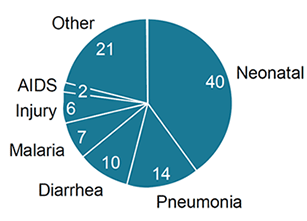Resource Spotlight: How Effective Are Community Health Workers?
The purpose of this review is to assess the effectiveness of community health worker (CHW) programs, with particular emphasis on how they have or how they might assist countries in achieving the health-related MDGs. Part of the challenge in addressing this issue is to not lose sight of the fact that CHW programs are not stand alone enterprises, but are a critical part of a system of activities that involve the larger formal health system, the community and specific interventions that require CHWs in order for them to reach those who need them.
Thus, this review is not just about the effectiveness of CHWs by themselves but the effectiveness of various programs and approaches in which CHWs play a critical role in providing services to those who need them. CHWs cannot achieve their full potential without the active engagement of communities as collaborating and supportive partners, without a supportive health system or health program that is involved in the selection of appropriate CHWs, their training, their ongoing support and supervision, including ensuring that they have the supplies, commodities, and medicines in order for them to function effectively, and without technical interventions that are known to be effective. [adapted from author]
View this resource.
The HRH Global Resource Center has other resources on this topic including:
- Knowledge and Performance of the Ethiopian Health Extension Workers on Antenatal and Delivery Care: A Cross-Sectional Study
- Improving CHW Program Functionality, Performance and Engagement: Operations Research Results from Zambia
- Can Volunteer Community Health Workers Decrease Child Morbitiy and Mortality in Southwestern Uganda? An Impact Evaluation
For additional resources on this topic, visit the Community Health Workers subject category.
Past Resource Spotlights
- 1127 reads





